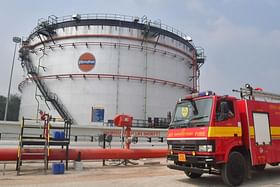State-owned Indian Oil Corporation (IOC) is planning to build a Rs 1,000 crore ($122 million) sustainable aviation fuel (SAF) plant at Panipat in Haryana to meet the surging demand for eco-friendly fuel.
The move to establish the nation’s first SAF facility should it be constructed, would help deal with availability issues as global supplies run significantly short of what’s needed by airlines to meet decarbonization goals.
“This is going to be a booming business. The reason for us to conceive such a big plant is that unless the capacity is higher, you won’t get the economies of scale,” said SSV Ramakumar, director for research and development in an interview.
Apart from IOC, Mangalore Refinery and Petrochemicals Ltd. is also planning to build a bio-ATF pilot plant at Mangalore using CSIR-Indian Institute of Petroleum’s technology using non edible oils and used cooking oil as feedstock.
What is SAF
SAF is a clean substitute for fossil jet fuels. Rather than being refined from petroleum, SAF is produced from sustainable resources such as waste oils from a biological origin, agri-residues, municipal solid wastes or algae.
SAF can reduce Carbon dioxide emissions by as much as 65 per cent over the fuel’s life cycle with the potential to reach 100 per cent in future. It is recognised as offering the most immediate and greatest potential to decarbonise aviation over the next 20-30 years.
The International Civil Aviation Organization (ICAO) last year adopted a target to cut emissions to net zero by 2050, and SAF has long been seen as the industry’s fastest way to reduce emissions.
However, global output is currently only a fraction of what’s needed and airlines are banking on a huge supply boost.
Alcohol-to-Jet (ATJ) technology
The SAF plant is likely to be built at Indian Oil’s Panipat refinery north of New Delhi and utilise LanzaJet’s leading and proven Alcohol-to-Jet (ATJ) technology.
The facility will have capacity to produce 86.8 Thousand Metric Tonnes Per Annum (TMTPA) of SAF and Indian Oil is seeking to partner with other oil companies on the project.
Earlier in February 2023, Indian Oil had entered into a memorandum of understanding (MOU) with LanzaJet, to pursue large capacity SAF production in India based on LanzaJet’s leading and proven Alcohol-to-Jet (ATJ) technology using Indian waste and ethanol sources.
Policy Boost
The much-needed plan to indigenise SAF production, however, will need major policy interventions to make it sustainable.
To start with, tax incentives will be needed for Indian Oil to push ahead with the investment in the plant, Ramakumar said, without elaborating.
The next step will be a government recommendation to blend SAF with jet fuel, which will be key to airlines signing supply agreements with Indian Oil.
An oil ministry panel, which Ramakumar leads, recommended an initial blending of 1 per cent SAF into regular fuel from 2026 followed by a gradual ramp up, he said.
Further, airlines will also need tax breaks from the government or carbon credits to make it viable to use SAF due to the tight cost of operations, he said.









